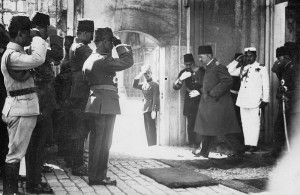http://www.washingtonpost.com/world/europe/syria-is-sticking-point-between-russia-and-the-us-on-the-islamic-state/2014/09/22/9edc3833-98de-4754-9af7-ad81223d8feb_story.html
Another article about the divergence in western and Russian attitudes about how to handle the IS threat, but coming form a different source (the Washington Post). This article says they both agree that it’s crucial to crush the threat, but Russia holds a “we-told-you-so” attitude towards the U.S.’s middle eastern policies, which they believe are the root of the terrorism problem. The article talks more about Russia’s suspicions that the U.S. will use the IS threat to bomb the regime and act outside of international law (sovereignty). U.S. plans to train and arm Syrian rebels in particular concern Russia about helping the U.S. because it may make them complicit in overthrowing Assad. It seems that one of the main reasons the U.S. isn’t willing to work things out with Russia is the situation in Ukraine, and the reason Russia won’t work with the U.S. is for similar reasons but with Syria.
http://www.washingtonpost.com/world/europe/ukraine-accuses-russia-of-major-cross-border-incursion-to-aid-separatists/2014/11/07/c17f9152-667f-11e4-ab86-46000e1d0035_story.html
I read this article because I wanted to know more about Russia and Ukraine. Although it is not directly about the middle east, the situation in Russia and Ukraine seems to be relevant to Russian and U.S. relations, which impacts the situation in Syria. It seems that Russia is not explicitly supporting rebel separatists in Ukraine, or at least not admitting it. Instead of using the word “recognize”, they used the word “respect” in regards to the rebel elections to avoid full on explicit support for the rebels, but Ukraine believes that Russia does indeed support the rebels and is sending military aid to them, such as tanks and troops. However, the claims discussed in this article were not backed by any sort of evidence. Is Russia invading Ukraine? There seems to be some confusion, denial, and/or finger pointing as to who provoked what. Trying to learn about these things frustrates me because it seems like one can never really be certain of the truth. For all I know, computers may be way smarter than we think and fake every Turing test just to trick us and then make up half these situations we read about on the internet to invoke action from humans to carry out wars with other computers, or even to enslave us to perpetuate their existence. Like 2001 a Space Odyssey kinda stuff.
